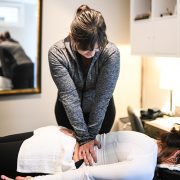Why Cortisone Shots Often Fail in the Knee
When you’ve got nagging, persistent knee pain, it’s common for doctors to recommend a cortisone shot in the knee.
A cortisone shot in the knee, also known as corticosteroid injections, or “steroid shots”, works by reducing inflammation in your knee joint in an effort to alleviate pain. Sounds pretty straightforward, right? Well… not so fast.
Assuming your knee pain is truly due to inflammation, then yes, a cortisone shot can be a successful treatment option. For example, it’s often used as a pain management strategy when you’re awaiting a major joint replacement surgery.
Advanced osteoarthritis is a common cause of knee inflammation. The only real “cure” for this is joint replacement. Periodic cortisone shots may help give you the pain relief you need to pass the time until surgery. But this is a very specific and not common circumstance.
What we see more often than not is cortisone shots either working temporarily, or not working at all in your knee joint.
Patients are often told they need up to three cortisone shots to see results. There’s a problem with this approach. Every time you get a cortisone shot, you risk damaging the cartilage and tissue in your knee joint. This not only leads to irreversible joint damage, but more persistent pain in your joint that gets harder and harder to fix.
So when it comes to whether or not you should get a cortisone shot in your knee – you really want to make sure that the root source of your problem is inflammation.
The reason why so many cortisone injections “fail” is because quite often – they weren’t needed in the first place. Even though the knee pain you are experiencing might be due to inflammation, the underlying cause leading to that inflammation could be something else entirely. Eight percent of the time the knee pain you’re experiencing is due to a mechanical or movement problem.
So while the symptoms you’re experiencing could be inflammatory in nature, the root cause of your issue is not. A cortisone shot is not going to help your knee in this case. Or worse, you’ll get temporary relief that fools you into thinking it worked. This only delays treatment that will give you the long-lasting relief you’re looking for.
So how do you know if you have a true inflammatory problem in your knee?
Let me explain.
Let’s say you have some arthritis and general wear and tear in your knee joint. You have good days and bad days. The pain comes and goes. Certain movements and exercises make your knee feel better while others seem to really aggravate it.
This is a pretty classic presentation of a mechanical knee problem. The mechanical issue (aka movement problem) in your knee can irritate certain structures within your knee joint (like a meniscus or ligament) and cause it to be inflamed.
If you go ahead and just inject cortisone into this knee, it might relieve the inflammation for a short time. It won’t help the underlying movement problem. It’s only a matter of time before the cortisone wears off and the structures in your knee feel irritated again. Not only have you masked the problem, but now you risk creating actual damage to those structures from the cortisone. Studies have shown that repeatedly injecting cortisone into your knee (or any joint) can advance the formation of osteoarthritis.
Another interesting statistic is that 41% of knee pain has been shown to be coming from your spine – even when there is no back pain present.
In this case, your knee could really hurt and appear to be inflamed. If a doctor can’t find any real explanation for this from an X-ray or an MRI (because the real problem is coming from your spine), he or she may assume it’s just inflammation from wear and tear and suggest a cortisone shot. This is not going to help your knee. Once again you risk causing real damage to an otherwise healthy knee joint.
These are just a few examples of where cortisone shots are unnecessary and can go wrong when incorrectly prescribed.
Have you recently had a cortisone shot in your knee and it didn’t work? It could be that you never actually needed it. Or that the symptoms (inflammation) was being addressed instead of the underlying cause.
If you are considering a cortisone shot in your knee, it’s always a good idea to get a second opinion to make certain you really need it. A mechanical pain expert can tell you whether or not your knee pain is truly due to inflammation. If your knee pain is due to a movement problem (80% of time it is) then a proper movement prescription is your answer.
Are you local to Portsmouth, NH and looking for help with your knee pain NOW?
Consider speaking to one of my specialists.
Tell them about your knee pain and they’ll see if we would be a good fit to help you!
Dr. Carrie Jose, Physical Therapist and Pilates expert, owns CJ Physical Therapy & Pilates in Portsmouth and writes for Seacoast Media Group. To request a free copy of her Knee Pain Free Report CLICK HERE or to get in touch, email her at [email protected].




